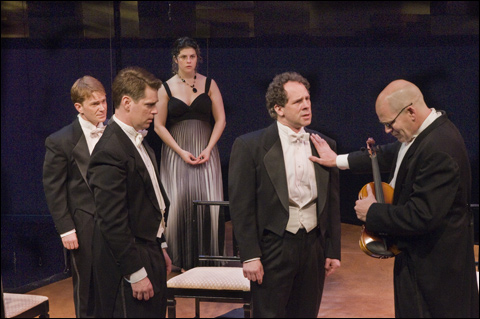
OPUS: Who knew a string quartet could be like a live organism copulating with itself? |
Yikes! Is this really what it’s like behind the scenes with, say, the Emerson String Quartet? If so, they should sell tickets to the green room as well as to the concerts. Violinist-turned-playwright Michael Hollinger’s Opus, which is enjoying a sharp New England premiere by New Repertory Theatre (at the Arsenal Center for the Arts through April 17), explores the intense, near-familial intimacy of artistic collaboration by peeping through the off-stage keyhole as a renowned string quartet, some 10 years into its four-way musical marriage, comes unstrung. Although some clinkers — and a glaringly wrong note at the end — are struck, the 90-minute play boasts a cleverly musical construction (reflected in Cristina Todesco’s set design, in essence a platform hung from strings) as well as a light touch. And under Boston University School of Theatre head Jim Petosa’s direction, the work is performed as subtly as its melodramatic ornaments will allow by a quintet of performers who string-synch serviceably to snatches of recorded Bartók and Beethoven and whose individual members demonstrate that, even if they can’t really play their instruments, they can keep Opus in fine tune.
Looping back on itself like a musical composition, Hollinger’s play alternates between the implosion triggered when the high-profile Lazara String Quartet ousts its most brilliant if unstable member and a series of flashbacks — some of which are scenes from a documentary made about the group. This resolves into a coda that, were it not for the incredible splintering that preceded it, would make for a touching contrast between the conjoined and infinite future imagined by four individuals trained to lie down as if under one bow and what becomes a seriously unmade bed.
And don’t blame the sexual metaphor on me — we hear in the first scene that the quartet, when performing well, is like “a live organism copulating with itself.” But as Dr. Ruth would surely tell you, said organism is then subject to the dysfunction of its parts. In this case, some of that dysfunction was built in from the get-go, when the volatile Dorian and the silkier but equally domineering Elliot tossed a coin for the first violinist’s seat, consolation prize being the violist’s position. Now first violinist Elliot, second violinist Alan, and cellist Carl have staged a sort of coup, dismissing the difficult, possibly suicidal Dorian, with his “complex history with chemicals” and insistence on perfection (this despite his having scored the group the pair of 18th-century instruments from which it takes its name). All are concerned when the troubled genius immediately goes missing. But there is a looming White House gig to be watched by 15 million television viewers, so auditions, rather than a search, get under way. And very soon the timid if ambitious Grace — a prodigy recommended by the musicians’ former teacher, and the group’s first female member — is engaged. Dorian, however, is not the kind of guy to waft gently, whether off a ledge or out of his marked musical territory. So don’t expect him to be limited to the flashbacks.